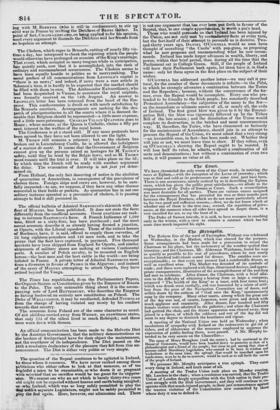The question of the Repeal continues to be agitated in
Ireland, by those whom it concerns. We have never ranked among those politicians who either refuse to look at that measure, as of too frightful a mien to be examinable, or who deem it so pregnant svith mischief that no sacrifice would be too great for its 'siippres- orlon. We cannot see why an act which is barely thirty-two years old might not be repealed without heaven and earthbeing mingled; cr .why Ireland, which was so long safely permitted to play the 41111 WWI* separate Legislature, might not be safely permitted to play the fool again. Here, however, our admissions end. There
is not one argument that has ever been put forth in favour of the Repeal, that, to our simple apprehension, is worth a pin's head. Those who would persuade us that Ireland has been injured by the Union, are not only met by contradictory facts at every turn, but the fact itself of their attempt to persuade us is decisive. Two- and-thirty years ago, DANIEL O'CONNELL would as soon have thought of assaulting "the Castle" with pop-guns, as proposing what he now proposes and recommending what he now recom- mends. Ireland has made larger advances in wealth, liberty, and power, within that brief period, than during all the time that the Parliament sat in College Green. Still, if the people of Ireland will have their Parliament back again, let them have it, in God's name: only let them agree in the first place on the subject of their wishes.
O'CONNELL has addressed another letter—we may eall it pro- tocol, for the number of these documents is infinite—to the Pilot, in which he strongly advocates a combination between the Tories and the Repealers ; because, without the concurrence of the for- mer, even the Repeal would be incomplete. Every one who pre- tended to be friendly to the Irish people, has constantly described Protestant Ascendancy—the subjection of the many to the few-- as the immediate or ultimate source of all, or nearly all, the evils of Ireland. The first great blow was given to it by the Emanci- pation 'Bill; the blow was vigorously followed up by the Tithes Bill of the late session ; and the dissolution of the Union would complete its destruction, in the briefest and most unceremonious way. If, therefore, the Tories, who have clamoured so furiously for the maintenance of Ascendancy, should join in an attempt to procure the Repeal of the Union, we must admit that a very strong —an irresistible case, in fact—has been made out. Whether they will join or not, we must leave time to show. If they refuse, even on O'CONNELL'S showing the Repeal ought to be resisted. It will lose half its value, he admits, without a combination of all sects and denominations; but without a combination of even two sects, it will possess no value at all.


























 Previous page
Previous page